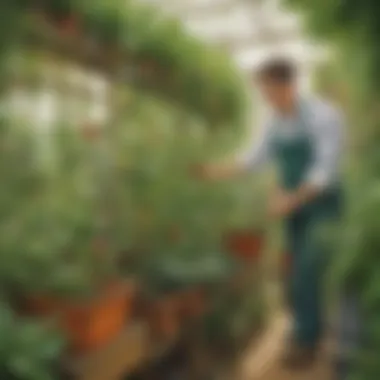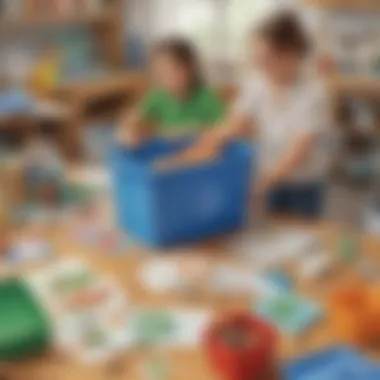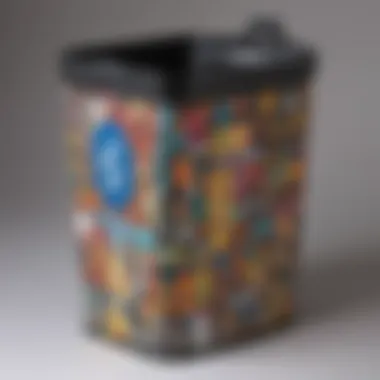Discover the Fascinating Recycling Experiments for Young Scientists


Science Fun Facts
Did you know that recycling one aluminum can save enough energy to run a TV for three hours? This showcases the incredible impact of recycling on energy conservation. Young science enthusiasts can explore how simple actions like recycling can make a big difference in preserving resources and reducing waste. Understanding the lifecycle of materials through recycling can open doors to environmental stewardship and sustainable practices at a tender age.
Discover the Wonders of Science
As young learners engage in recycling experiments, they also delve into various scientific concepts. Concepts such as conservation of energy, decomposition of materials, and chemical reactions come to life through hands-on activities. Artsy animations and interactive tools can further enhance their understanding and make the learning experience immersive and enjoyable. Through real-life examples and applications, children can grasp the practical significance of recycling and its broader implications in sustainability.
Science Quiz Time
Let's test your knowledge with interactive quizzes on recycling and environmental science! Multiple-choice questions challenge young minds to think critically about waste management, recycling processes, and the environmental impact of everyday choices. Brain teasers and puzzles add a fun twist to learning, encouraging cognitive engagement and problem-solving skills development. By gamifying the learning experience, children can absorb key concepts while having a blast exploring the fascinating world of recycling.
Science Experiment Showcase
In the science experiment showcase, young Science Buddies can explore fun and engaging experiments that highlight the principles of recycling. From creating recycled paper to crafting eco-friendly art, step-by-step instructions guide children through each project, ensuring they grasp the scientific processes involved. A detailed materials list outlines the items needed for each experiment, promoting preparedness and organization. Safety tips and precautions emphasize the importance of responsible experimentation, fostering a culture of safe and sustainable scientific exploration.
Introduction
In the world of today, where environmental issues hold paramount importance, understanding the concept of recycling becomes crucial for young minds. Recycling is not merely a word; it embodies a practice that can shape the future of our planet. This article aims to introduce young science enthusiasts, aged 6-12, to the fascinating world of recycling through engaging experiments and activities. By delving into these recycling experiments, children can gain a deeper appreciation for the environment and sustainability, all while nurturing their curiosity in the realm of scientific exploration.
Recycling is not just about sorting items into different bins; it involves a complex process that extends beyond the surface level. The act of recycling plays a pivotal role in conserving resources, reducing waste, and minimizing the negative impact on our environment. Through hands-on experiments and activities tailored to their age group, children can witness firsthand how simple actions can lead to significant outcomes. By immersing themselves in these recycling activities, young learners can grasp the importance of their role in creating a more sustainable world.
One of the fundamental aspects of the Introduction is to lay a strong foundation for understanding recycling concepts. By providing a clear definition of recycling and highlighting its importance, children can comprehend the significance of their actions when it comes to waste management. Furthermore, exploring the impact of recycling on the environment allows young science enthusiasts to connect the dots between their actions and the broader ecosystem. By immersing children in these experiential learning opportunities, this article seeks to kindle a passion for environmental stewardship and scientific inquiry at a formative age, setting the stage for a future generation of eco-conscious individuals.
Understanding Recycling
In the realm of environmental consciousness, a crucial concept that children aged 6-12 are encouraged to grasp is the essence of recycling. Understanding recycling goes beyond the mere act of sorting waste; it involves comprehending the significance of reducing resource consumption and waste output. By acquainting young minds with the fundamentals of recycling, we instill in them a sense of responsibility towards the planet. This section delves into the intricacies of recycling, shedding light on its manifold benefits and the broader implications it holds for our ecosystem.


Definition of Recycling
At its core, recycling encapsulates the process of converting waste materials into reusable objects. By collecting, segregating, and processing items like paper, plastic, glass, and metal, we minimize the extraction of raw resources, thereby conserving energy and reducing pollution levels. Diving deeper, children will discover that recycling embodies a cyclical approach to material consumption, emphasizing sustainable practices for a cleaner future.
Importance of Recycling
The significance of recycling lies in its capacity to mitigate the environmental impact of human activities. By diverting waste from landfills and incinerators, recycling plays a pivotal role in lowering greenhouse gas emissions and preserving natural habitats. Through interactive learning experiences, budding environmentalists will realize how their individual actions can contribute to larger conservation efforts, fostering a sense of empowerment and environmental stewardship.
Impact on the Environment
The far-reaching impact of recycling on the environment cannot be understated. From curbing deforestation by using recycled paper to decreasing air and water pollution through responsible waste management, recycling serves as a frontline defense against environmental degradation. Engaging with the intricate web of cause and effect, children will unravel the intricate ways in which recycling safeguards ecosystems and promotes sustainable living practices.
Recycling Experiments
Recycling experiments play a vital role in enhancing children's understanding of sustainability and environmental conservation. By engaging in hands-on activities like making DIY recycled paper, creating upcycled crafts, building a compost bin, investigating biodegradable materials, and designing a waste sorting game, young science enthusiasts can learn practical ways to contribute to a greener planet.
Making DIY Recycled Paper
Materials Needed:
For creating DIY recycled paper, you will require used paper scraps, a blender, a basin of water, a mold and deckle, and a towel. The used paper scraps allow children to witness the transformation of waste into a useful product, promoting the concept of upcycling.
Step-by-Step Instructions:
The process involves tearing the paper scraps into small pieces, blending them with water to create a pulp, and then pouring the mixture onto the mold and deckle to form sheets of recycled paper. This hands-on approach instills a sense of creativity and eco-consciousness in children.
Scientific Principles Involved:
The scientific principles at play include understanding the physical processes of papermaking, such as pulp formation, water drainage, and drying. Through this experiment, children grasp the scientific concept of transformation and the importance of resource conservation.


Creating Upcycled Crafts
Ideas for Upcycled Crafts:
Upcycled craft ideas may include turning old jars into candle holders, making jewelry from scrap materials, or creating artwork from discarded papers. These activities encourage children to repurpose waste creatively, promoting sustainable practices.
Creative Techniques:
Innovative techniques like decoupage, mosaic art, and fabric weaving can be employed to upcycle materials effectively. Children not only explore their artistic talents but also understand the value of reusing items in innovative ways.
Environmental Benefits:
The environmental benefits of upcycling crafts lie in reducing waste sent to landfills, conserving resources, and minimizing the need for new raw materials. This experiential learning process instills a sense of responsibility towards the environment in young minds.
Building a Compost Bin
Materials and Setup:
To build a compost bin, you will need a container, organic kitchen waste, yard clippings, and a shovel. The setup provides children with a hands-on experience of composting, showcasing the natural decomposition process.
Composting Process:
The composting process involves layering organic materials, maintaining moisture levels, and turning the compost regularly. Children learn about the significance of organic recycling and its role in enriching soil health.
Using Compost for Plants:
Utilizing compost as a nutrient-rich fertilizer for plants demonstrates the cyclic nature of resources. Children witness firsthand how waste can be converted into a valuable resource for promoting plant growth and soil fertility.


Investigating Biodegradable Materials
Testing Biodegradability:
Through testing the biodegradability of materials like paper, cardboard, and plant-based plastics, children understand how certain substances break down naturally. This experiment highlights the importance of choosing environmentally friendly products.
Comparing with Traditional Materials:
Comparing biodegradable materials with traditional plastics in terms of decomposition rates and environmental impact elucidates the benefits of eco-friendly alternatives. Children grasp the importance of sustainable material choices in reducing pollution.
Implications for the Environment:
The implications of using biodegradable materials revolve around reducing non-biodegradable waste accumulation, minimizing landfill burden, and mitigating environmental harm. Children learn how small choices in material selection can contribute to a healthier planet.
Designing a Waste Sorting Game
Game Objectives:
The waste sorting game aims to educate children on proper waste segregation, emphasizing the significance of recycling and reducing contamination. By sorting items into different categories, kids develop an understanding of waste management practices.
Gameplay Instructions:
Players are guided to sort items like paper, plastics, and metals into designated bins within a specified time. This interactive experience fosters decision-making skills and reinforces the importance of proper waste disposal.
Learning Outcomes:
The game leads to learning outcomes such as improved waste management knowledge, enhanced environmental awareness, and motivation to engage in sustainable practices. Children develop a sense of responsibility towards waste disposal and resource conservation.
Conclusion
Recycling forms the cornerstone of environmental sustainability, and introducing youngsters to the concept from an early age sets a solid foundation for responsible habits and eco-conscious behavior. By engaging in recycling experiments, children not only grasp the importance of resource conservation and waste reduction but also develop critical thinking skills and a deeper appreciation for the environment around them
One of the key benefits of the activities outlined in this article is their ability to make complex ecological concepts accessible and enjoyable for young minds. Through hands-on tasks like making recycled paper, creating upcycled crafts, building a compost bin, exploring biodegradable materials, and designing a waste sorting game, children can actively participate in and learn about sustainable practices in a fun and interactive manner
Moreover, these experiments foster a sense of agency and empowerment in children, showing them that even small actions like recycling and composting can contribute to large-scale positive changes for the planet. By emphasizing the role of each individual in creating a healthier environment, these activities instill a sense of stewardship and environmental responsibility in the next generation







